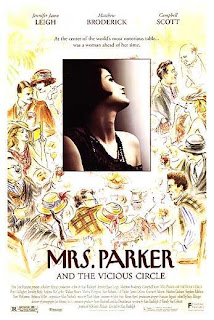


my brother tells me that when i become interested in something - be it a film, book, author, television show, whatever - i become something like a woman obsessed. he's 14, so he says it to tease (and i tell him he's wrong). but secretly, i've realized that he's very right.
since watching "mrs. parker and the vicious circle," dorothy parker has become my newest point of interest, and i will read anything i can get my hands on to know more about her, and about the algonquin round table (also known as "the vicious circle").
of course, this all stems back to my interest in anything pertaining to the 1920's - the "lost generation," the meetings in paris of minds like f. scott fitzgerald and earnest hemingway, the flapper generation, the jazz age, sylvia beach's iconic "shakespeare and company," the emptiness and hedonism of a generation between wars, books by evelyn waugh. all of that however lay in the realm of expat life, which was rampant in the 1920's. dorothy parker however has brought me home.
watching two movies about the '20's back to back ("bright young things" and "mrs. parker..."), along with my recent book purchases ("the beautiful and the damned," "a moveable feast," and the diaries of anais nin) have probably fueled the obsession. or as i like to think of it, stoked the fires of my curiosity.
the algonquin round table began as a joke. in 1919, one member invited another to lunch at the algonquin hotel, supposedly to celebrate the latter's return from europe. in fact, the former took the opportunity to thoroughly roast the latter, and the joke was enjoyed so much that lunch at the algonquin became a daily ritual for this collection of literary humorists, satirists, wits, and critics.
they met there for lunch (and outside of lunch) from 1919 til 1929. the "ten-year lunch" resulted in countless collaborations, friendships, and affairs (both real and imagined) between the circle. from this group arose the cultural icon that is "the new yorker."
like any friendship, it had its tensions, its jealousies and critics. after 1929, when the group disbanded because of projects that took them outside the scope of new york city, many found they no longer had anything to say to one another. they became dissatisfied, and dorothy parker herself derided the group as just a bunch of jokesters looking for a forum for their wit.
but something about the idea appeals to me nonetheless.
No comments:
Post a Comment